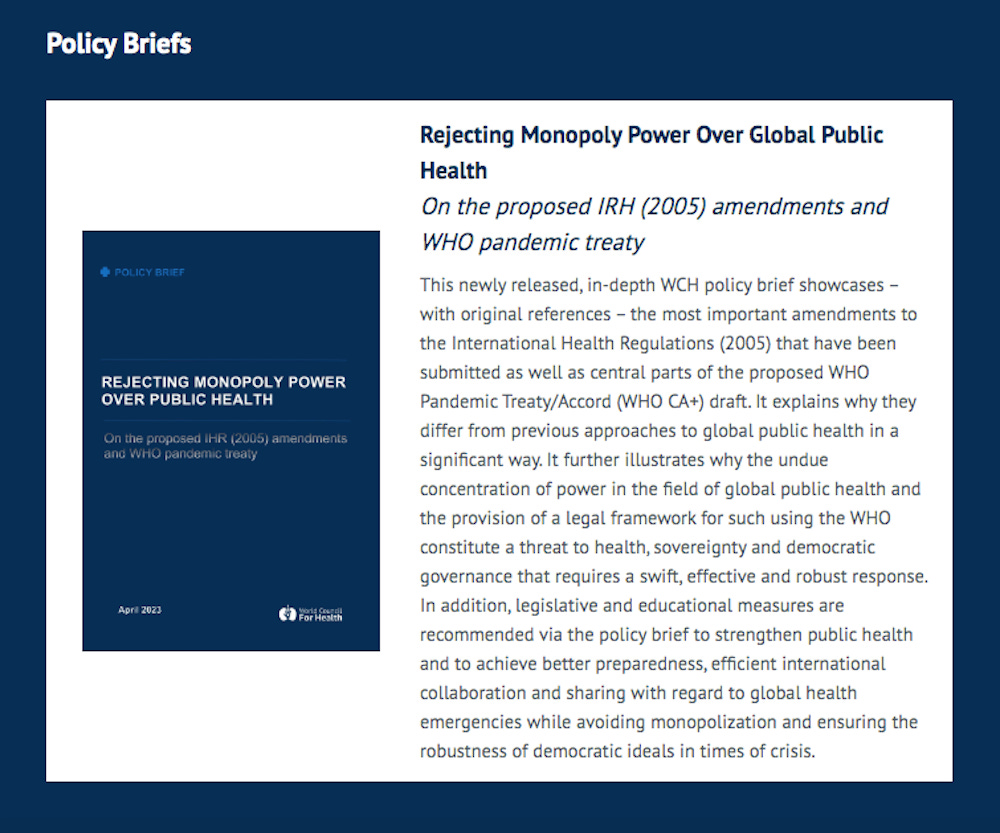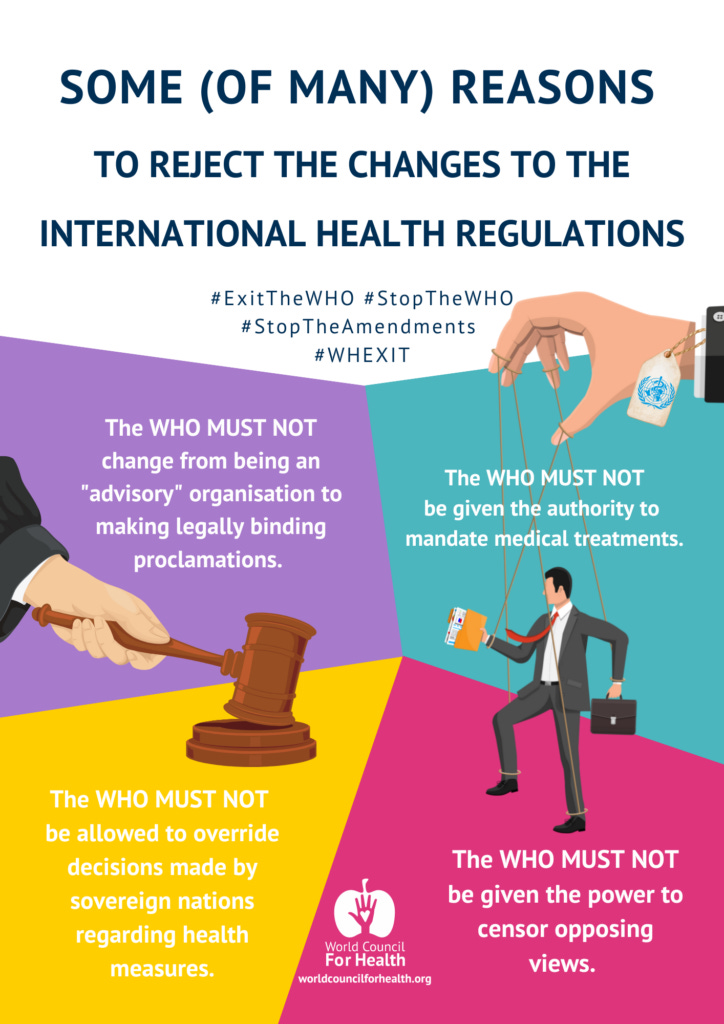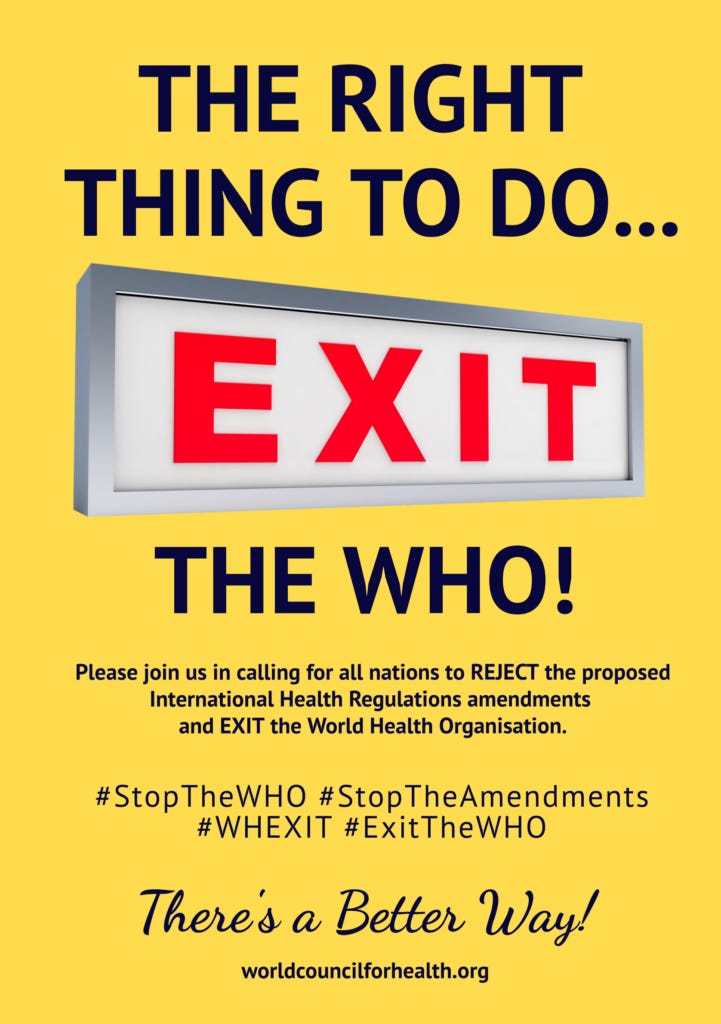World Council For Health Policy Brief
The World Council for Health has published a 45 page Policy Brief entitled “Rejecting Monopoly Power Over Public Health” On the proposed IHR (2005) amendments and the WHO pandemic treaty.
https://worldcouncilforhealth.org/news/news-releases/monopolization-of-global-health-policy-brief/
Here are some excerpts…
Officially, the IHR amendments and the pandemic treaty are presented as instruments to increase international collaboration, efficient sharing of information and equity in the case of another global health crisis. De facto, they can turn into instruments to replace international collaboration with centralized dictates, to encourage the stifling of dissent and to legitimize a cartel that imposes on populations interest-driven health products that generate profits over those that work better but are less profitable.
-page 3
The World Council for Health (WCH) unites over 190 coalition partners globally. The WCH calls for the amendments to the IHR (2005) as outlined in Chapter II of this document as well as for the pandemic treaty as currently proposed to be rejected.
They represent a framework for the illegitimate exercise of global governmental power without popular accord, constitutional control mechanisms or accountability. As such, they create a dangerous precedent if passed.
The scope of the advisory WHO mandate and the powers provided to the WHO via the IHR (2005) should not be expanded.
-page 5
The envisioned legal framework for monopoly power over aspects of global public health will not lead to better pandemic preparedness but to a repetition of some of the worst decisions taken during the COVID pandemic in the event of a future emergency. The envisioned legal framework for monopoly power over aspects of global public health is not a sign of progress but represents a backsliding in human development to the times of feudal systems, colonialism and centralized empires.
-page 5
No monopoly power should be handed to any person, institution or organization. If an entity had such powers and made poor choices or fatal mistakes, it would be difficult to counteract them and societies could crash. That is one reason why it is important to have diverse poles of power and effective democratic control mechanisms in place.
-page 32
Digital surveillance systems that rely on a form of digital certificate in some of their functions are an instrument for the empowerment of the few and the submission of the masses. As in the example of China or Indonesia, digital health certificates are used to control movement and achieve compliance with centralized directives, whether they have a proper rationale or not. In a number of countries, digital health certificates were used – against basic ethics – to coerce the uptake of medical products that later proved to have the potential for fatal side effects, to be contraindicated in a vast spectrum of society and to neither stop infection nor transmission. At one point, people that had taken the medical product but were infected could still go to places while people who had not taken it but were not infected could not. This shows the arbitrariness with which directives, even if negative for public health, can be imposed.
-page 35
Free speech and free press are essential safeguards against overreach by those in positions of power. The establishment of an industrial censorship complex – closely linked to executive branches of government, national security entities and private stakeholders – is anti-democratic in nature and presents an attempted subversion of basic human as well as constitutional rights under false pretense. The aim of this complex is not to combat fake news but to control the content and flow of information. It is a naive and dangerous fallacy to believe that the ones with the power to censor must always be on the side of truth or know at all times what the truth is. Information is best separated from misinformation through an open exchange and discourse that makes use of the best evidence available. The inclusion of different qualified perspectives, including those that deviate from official line, benefits societies in times of crisis and beyond, provides balance and can overthrow false paradigms.
-page 37
The proposed IHR amendments and the pandemic treaty – if agreed upon – will inevitably be used to advance the interests of a few powerful actors that have compromised the WHO at the expense of others. They can use these instruments to replace international collaboration with undemocratic centralized dictates, to encourage censorship and to legitimize a cartel that imposes on populations interest-driven health products that generate profits over those that work best – under the disguise of equity.
International collaboration and sharing to benefit global health cannot be improved by assigning undemocratic concentrated power to an unelected, unaccountable and compromised supranational organization.
Any excessive concentration of power or monopoly power in the hands of a few without a popular mandate and constitutional control mechanisms to restrain it, by nature, leads to abuse of power, undermines and compromises democratic processes, corrupts science, curtails choice, suffocates competing solutions, enables control over the flow of information and stifling of dissent.
Handing more power to the WHO, at this point, equals handing more, not less power to the special interests (national and private) that have, unfortunately, compromised the organization and impeded efficient responses to a number of infectious disease emergencies as well as other global health issues in the recent past.
That is why the amendments to the International Health Regulations (2005) discussed in Chapter II and the pandemic treaty (WHO CA+) as outlined in its zero draft must be opposed and rejected when they are put to a vote in either May 2023 or May 2024. Should they pass, countries need to opt out of the revised Regulations within 10 months and need to reject ratification of the treaty. In addition, prudent legislative and educational measures, as outlined in Chapter V of this document, should be introduced, passed and implemented to counter any monopolization or attempts at monopolization, to safeguard democratic ideals and to benefit public health.
-page 41
The World Council for Health Policy Brief detailed 5 categories for a Better Way forward for global public health:
A. Decentralization of control and the rights of the individual
B. The right to privacy: digital ID, digital certificates and private (health) data
C. Free speech and the right to dissent
D. International sharing and integrity of regulatory processes
E. Defunding and halting gain-of-function research
The World Council for Health Policy Brief recommended that the following actions should be taken nationally and internationally:
The amendments to the International Health Regulations (2005) as proposed and the pandemic treaty/accord (WHO CA+) as outlined in its zero draft must be opposed and rejected when they are put to a vote. Should they pass, countries need to opt out of the revised Regulations within 10 months and need to reject ratification of the treaty.
Legislation that limits supranational organizations to providing a forum for exchange, advice and response capabilities should be introduced, passed and implemented. These organizations have no popular mandate, are not subject to democratic control mechanisms, and lack accountability to impose rules or policies. Supranational bodies like the WHO should also generate the majority of their funds from member states. These member states should not earmark their contributions to enable the organization to act free from national interests. To further prevent corruption, it should also be prohibited for the supranational body to accept funds from private stakeholders and corporations that have financial interests in relation to the issues the organization engages with.
Control over health policies should be decentralized via legislative measures, with local states, state parliaments, courts and referenda playing a more central role than federal governments. Legislation should also prevent any decision-making power that can override national democratic institutions being handed to an unelected supranational body.
Legislation needs to be introduced, passed and implemented that provides solid legal protection to the doctor-patient relationship and hands patients the exclusive right to decide on individual medical treatment based on the clinical judgement and advice of their chosen physicians as well as the legal precept of informed consent. Outside interference in the inviolable doctor-patient relationship, by government, captured health agencies or hospital administrators, must be prohibited.
Legal protection must be given to the repurposing of safe off-patent drugs/substances even when industry interests try to curtail their use.
The conflicts of interest that have compromised a significant number of governments, health agencies, science and academia, international organizations and supranational bodies must be carefully investigated.
Any form of digital ID with a consolidation of all data relating to an individual at a single point of reference must be prohibited via adequate legislative measures. Such a single digital point of reference poses a significant risk to individual rights, data safety as well as national security and can be abused by anti-democratic actors and hostile entities.
Educational measures to explain the dangers of digital IDs should be initiated and implemented.
Digital mining as well as control of private (health) data needs to be criminalized through legislation. The right to privacy – especially when it comes to matters of health – is a cornerstone of democracy.
Legislative measures must ensure that people have ownership over their own data at all times and that terms set by private or state entities that violate this norm are prohibited.
National and international organizations should commit to research on the following questions: Who owns and controls our data? Who is benefitting from trading in it? And why do we have no say over who gets it?
Whistleblower protection should more strongly be enshrined in national and international law. Diversified non-profit organizations should provide a safe forum and network for whistleblowers as well as for the amplification of their messages upon review of the strength of their information. Whistleblowers should enjoy special international protection similar to the one granted to witnesses in organized crime cases.
Educational and legislative measures to expose and end the encroachment on free speech and free press as an attempted subversion of basic human and constitutional rights should be initiated and implemented.
Educational measures should be undertaken and legislative measures should be urgently introduced, passed and implemented to expose and dismantle the anti-democratic industrial censorship complex.
Investments in media companies, whether through advertisement or other means, by the pharmaceutical industry or actors owning stock in that industry should be prohibited due to their undue influence on the fourth estate that is curtailing balanced coverage of facts and events.
Private stakeholders should legally only be allowed to contribute sums over US$ 50,000 per year to two media corporations total, either as a person or with any of their organizational entities, to avoid concentrated power by single entities over a wide spectrum of media outlets.
Forums discussing international matters should allow for a strong civil society participation in the decision-making process.
The responsibility for charitable distribution of safe and effective medicines as well as other health products should be handed to diverse faith-based and other non-profit organizations who are trusted on the ground, have adequate capabilities and don’t have conflicts of interest.
The same organizations should work with local communities and states to systematically build up own capacities.
The undermining of the regulatory process when it comes to the length and quality of clinical trials should be prevented.
A Right to Try should be enshrined in national and international law.
Educational measures need to be implemented to explain the nature and biosafety hazards of gain-of-function research. Experts without conflicts of interest educating on the risks should be offered a platform.
The gain-of-function research that took place in relation to SARS-CoV-2 in Wuhan, China, with US tax-payer money as well as the systematic suppression of information relating to it needs to be exposed.
Legislation to ban gain-of-function research, its funding and outsourcing must be introduced, passed and implemented.
Emergency planning must reprioritize health, human dignity and rights.
Educational measures should remind people of, and place a focus on, the importance of the concepts of human dignity and human rights as well as on the history of overreach by those in positions of power.
A variety of sensible approaches to global health emergencies should be considered while ensuring their integrity against attempts to misappropriate them.
StopTheWHO.com
StopTheGlobalAgenda.com
RejectDigitalEnslavement.com
ExitTheWHO.com
ExitTheWHO.org
by James Roguski
The old system is crumbling, and we must build its replacement quickly.
If you are fed up with the government, hospital, medical, pharmaceutical, media, industrial complex and would like to help build a holistic alternative to the WHO, then feel free to contact me directly anytime.
JamesRoguski.substack.com/about
JamesRoguski.substack.com/archive
310-619-3055
All content is free to all readers.
All support is deeply appreciated.










HOORAY FOR THE WORLD COUNCIL ON HEALTH!
SCREW THE WHO AND THE HORSE THEY RODE IN ON!
Supporting James Roguski's heroic work (StopTheWHO.com) with a statement and useful links.
We the People are facing HORRIFYING TECHNOCRATIC PSYCHOPATHY TO DESTROY HUMANITY AND ALL NATURAL LIFE!
It was NEVER about health! The Powers That Should Not Be were ALWAYS about they want you DEAD or a SLAVE! This is a painful truth to accept but we the people must wake up and fight back!
We must never lose sight of the larger picture of the vile malignance we are fighting against.
There is an insidious global ruling class plot to enslave all life on earth behind all the madness and suffering inflicted on We the People.
How to fight back against this TOTAL SLAVERY!
RESIST! DO NOT COMPLY! DITCH THE DAMNED 'SMART' PHONES AND THE DAMNED QR CODES AND GO BACK TO LANDLINES OR FLIP PHONES AND USE CASH AS MUCH AS POSSIBLE! INSIST ON CASH! CBDC IS TOTAL SLAVERY!
Other than getting rid of nuclear weapons which I support 100% the rest of the anti-nuclear peace movement and CLIMATE CRISIS propaganda is parroting UN utter GARBAGE, a complete surrender to the ENSLAVEMENT AGENDA by the diabolical despots of Davos - ruling class criminals who lust for total power and control and all of whom should be tried and jailed for life and their malign organizations dismantled: the UN, the WEF, the IMF, the WHO, the BIS, NATO, Blackrock, Vanguard, The Rockefellers, the Rothschilds, The Bilderbergers, the CFR et al.
There is an evil predator globalist technocratic elite agenda of eugenics/depopulation/genocide using bioweapon poison jabs, war, geoengineering, EMF radiation, starvation and economic collapse - THE GREAT RESET/AGENDA 2030/4TH INDUSTRIAL REVOLUTION to get rid of billions of 'useless eaters' and to use nano tech to turn the survivors into ROBOTIZED COMPLIANT SLAVES! WAKE UP AND RESIST! DO NOT COMPLY! These are psychopath megalomaniacs who want to play god by turning all life into digitized metaverse mechanistic synthetic biology to be manipulated by their AI algorithms. A more demonic sickening idea is nearly impossible to imagine!
APPALLED AND HORRIFIED AT INSANE TYRANNICAL PROTOCOLS THAT HAVE NOTHING TO DO WITH HEALTH AND EVERYTHING TO DO WITH TOTALITARIAN CONTROL! REVERSE THIS NOW!
MAKE THE WORLD AND AMERICA 2019 (comparatively speaking), AND FREE AGAIN!
NO, I AM NOT AFRAID OF THE MORONIC SCARIANT SHMARIANT MONKEYSHINES! WAKE UP ALREADY!
TOTALLY CONDEMN BIDEN AND ALL OTHER POLS WHO HAVE NO POWER TO LAWLESSLY ACT LIKE AN EMPEROR OR DICTATOR AND DECREE JAB CROW 'SHOW ME YOUR PAPERS' FASCIST SEGREGATION/DISCRIMINATION/APARTHEID VIOLATIONS OF THE CONSTITUTION, THE NUREMBERG CODES AND EVERY CIVIL RIGHT IMAGINABLE.
NO GREEN NEW DEALS OR BUILD BACK BETTER FROM THE CRIMINAL TECHNOCRAT TYRANTS KLAUS SCHWAB AND HIS CRONIES FROM THE WORLD ECONOMIC FORUM.
STOP THE TERRIBLE TYRANNY OF THE TECHNOCRATS GLOBAL AGENDA OF TOTAL SURVEILLANCE AND CONTROL USING THE VIRUS AS EXCUSE AND PROPAGANDA TOOL!
NO MUZZLING STIFLING MASK MANDATES! NO FORCED VACCINES! END TORTUROUS DEVASTATING LOCK DOWNS NOW! I WANT MY LIFE BACK.
https://wrenchinthegears.com
https://www.stopworldcontrol.com/
https://www.thelastamericanvagabond.com
https://pandemicfacts.info
https://wearehumanwearefree.org/7-days-campaign/
https://sonsoflibertymedia.com/covid-19-roadmap-12-step-plan-to-create-a-totalitarian-new-world-order-were-on-number-8-headed-towards-number-9/
https://questioningcovid.com
https://www.corbettreport.com/interview-1581-james-corbett-breaks-down-the-great-reset/
http://www.stopcp.com/GlobalResetPSYOP/GlobalResetPSYOPMindMap.html
https://everydayconcerned.net/2020/09/04/breaking-major-investigative-report-by-association-of-french-reserve-army-officers-finds-covid-19-pandemic-to-have-a-hidden-agenda-for-global-totalitarianism-nanotech-chipping-of-all-5g-irradia/
Pam Popper: https://makeamericansfreeagain.com
Del Bigtree: https://www.brighteon.com/channels/highwire
https://www.technocracy.news
Naomi Wolf: https://dailyclout.io
www.nojabforme.info
https://www.globalresearch.ca/we-must-awaken-from-corona-coma-reject-great-reset-robotic-technocracy-assert-common-humanity/5745213
Thank you, James. This is great.
Keep up the fantastic work!